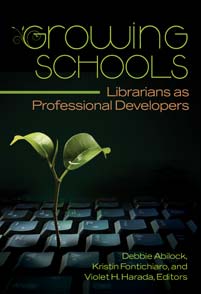 Just as students deserve equal access to information resources and the services of a professional school librarian, classroom teachers also benefit from working with a professional school librarian. In “How some California schools are overcoming school librarian shortages” written for EdSource: Highlighting Strategies for Student Success (spotlighted in the previous post), reporter Lillian Mongeau quoted Charles Drew College Preparatory Academy 3rd-grade teacher Laura Todorow: “I feel a school librarian is a non-negotiable necessity in any school.”
Just as students deserve equal access to information resources and the services of a professional school librarian, classroom teachers also benefit from working with a professional school librarian. In “How some California schools are overcoming school librarian shortages” written for EdSource: Highlighting Strategies for Student Success (spotlighted in the previous post), reporter Lillian Mongeau quoted Charles Drew College Preparatory Academy 3rd-grade teacher Laura Todorow: “I feel a school librarian is a non-negotiable necessity in any school.”
School librarians align the library collection with curricula and provide engaging books and electronic resources that support teachers’ teaching. They coplan and coimplement instruction to integrate literature and information into the classroom curriculum. Along with classroom teachers, they model and promote the behaviors of lifelong learning.
The National Education Association image “collaboration is everything” is spot on. When classroom teachers and school librarians coplan and coteach, they provide job-embedded professional development for one another. Teaching together in real time with real students, curriculum, resources, supports, and constraint helps educators become more proficient at their craft. Having a peer to bounce ideas off of and problem solve with is a growth opportunity that every educator should experience.
However, in schools without professional school librarians, classroom teachers, principals, and students may be unaware of what they are lacking. For educators who have not experienced the job-embedded professional development benefits provided by collaborating school librarians, I highly recommend Growing Schools: Librarians as Professional Developers (Abilock, Fontichiaro, and Harada 2012). Chapters in this book written by library practitioners and researchers alike highlight some of the many ways school librarians contribute to school improvement efforts.
School librarians can help the school learning community reach capacity. Through providing on-site professional development through coteaching, one-on-one faculty mentoring, and ongoing faculty workshops, school librarians are positioned as leaders who can assist principals in achieving their school improvement initiatives and reaching their academic goals for their schools.
All educators improve their instructional practices through working side by side with colleagues. On-site, job-embedded professional development is a win-win-win-win model for students, teachers, librarians/specialists, and administrators.
All educators deserve this kind of support for their own professional development. With so much pressure on teachers to improve student achievement, having real-time access to professional learning with a school librarian is a social justice issue for educators as well as for students. As Dr. Lankes states, “The greatest asset any library has is a librarian” (29). A professional, 21st-century, collaborating school librarian should be a non-negotiable necessity for every school.
Works Cited
Abilock, Debbie, Kristin Fontichiaro, and Violet H. Harada. Eds. Growing Schools: Librarians as Professional Developers. Santa Barbara, CA: Libraries Unlimited, 2012. Print.
Lankes, R. David. The Atlas of New Librarianship. Cambridge, MA: MIT Press, 2011. Print.
Mongeau, Lillian. “How some California schools are overcoming school librarian shortages.” EdSource: Highlighting Strategies for Student Success. 26 May 2014. Web. 2 June 2014. <http://tinyurl.com/CA-lib-staffing>.
